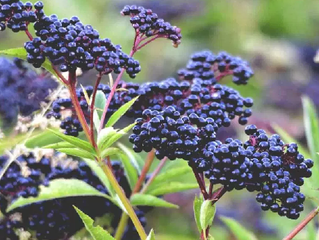Elderberry (Sambucus nigra)
Immunomodulating, antiviral, antibacterial, antioxidant, anti-inflammatory, diuretic.
Common uses today –
- Colds and influenza, and the symptoms associated with them including aches and pains, coughing, nasal congestion, catarrh and fever
- Supports healthy immunity
- Herpes virus infections
This is one of the nicer tasting herbs in my dispensary and is wonderful to use for both adults and children, dose appropriate. Elderberry has a wonderfully interesting history throughout many countries in the world and is listed in most ancient herbal remedy texts.
In 400 BCE Hippocrates referred to the elder tree as his “medicine chest.” Other noted classical healers, including Theophrastus, Dioscorides and Galen, regarded the elder as one of nature’s greatest healing plants.
Elderberries are used in traditional German medicine for the treatment of constipation, and in upper respiratory tract infections, for the alleviation of low back pain, headache and toothache. For treatment of these complaints patients consume elderberry juice, or they drink a cup of tea, several times per day. The infusion is prepared from 10g of dried berries standing in cold water for several minutes, then slowly heated up, and briefly boiled.
Elderberries, which have a higher antioxidant capacity than vitamin C or E, have been highly regarded in European folk medicine. In addition to colds they were also used for asthma, arthritis and constipation. For relieving symptoms of colds and flu they were usually taken hot, with sugar, just before going to bed. Elder flowers and elderberries have long been used in the English countryside for making many homemade drinks and preserves. The berries make an excellent homemade wine and winter cordial which improves with age.
Clinical research now shows that some elderberry extracts might reduce flu-like symptoms, have antiviral, immunomodulating and antioxidant effects and insulin stimulating properties.4.5.6.7.8.9
Thank you to The Herbal Extract Company – references available.

